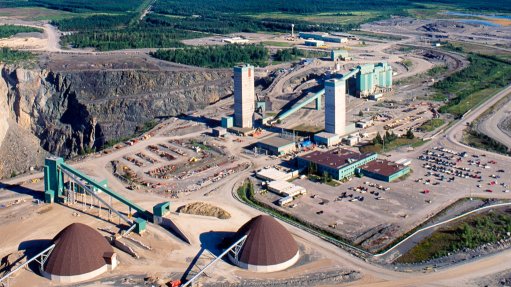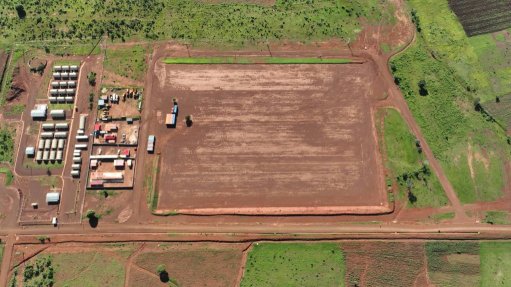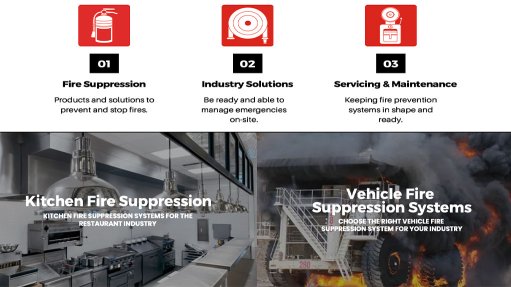Council increases mapping to drive South Africa's exploration attractiveness
As part of government’s response to keep the South African economy afloat during the outbreak of Covid-19 and beyond, the Council for Geosciences (CGS) has been mandated to increase its country-wide survey to bolster South Africa as an exploration hotspot once the lockdown is over.
CGS CEO Mosa Mabuza says one of the key interventions undertaken by the CGS is the expedited implementation of the Integrated and Multidisciplinary Geoscience Mapping Programme (IMMP) from the 2020/21 to the 2022/23 financial years.
The CGS started with the IMMP three years ago and, at that time, only about 5% of South Africa was mapped.
However, Mabuza notes that, since then, the CGS has managed to ramp up its country-wide mapping to 8.8%. “We are continuing with that programme, albeit that we are now fast-tracking [the areas that can more rapidly] unleash the minerals for the energy sector.”
The CGS is also prioritising its assessment of targeted minerals and associated drilling targets, as part of its contribution to igniting growth in the economy post Covid-19.
In terms of enhancing South Africa’s attractiveness as an exploration jurisdiction, Mabuza says the CGS is continuously improving applications of geoscience while also increasing its coverage.
“We have, for a long time, been performing at a level of mediocrity as a country in terms of the exploration [required] to replenish the mines, sustain economic growth and jobs, as well as sustain energy security.”
Through its efforts to bolster exploration, he says it is the CGS’s intention to “capture 5% of the global exploration budget”.
However, he points out that as a result of Covid-19 there has been a drastic drop in international exploration activity.
Quoting ratings agency Standards & Poor’s Global Intelligence’s latest report (published in May), Mabuza points out that junior explorer’s budgets are forecast to decrease by 42%, while other general international exploration budgets are forecast to decrease by 29%, from $10-billion, to $6.9-billion.
This, he says, reinforces the State’s investment in geosciences to improve South Africa’s attractiveness as an exploration jurisdiction.
“It is our belief that, with the geoscientific information we are generating, it is perhaps more opportune now to demonstrate the value of South Africa and its mineral potential, from traditional to new minerals,” Mabuza enthuses.
In this regard, the CGS is prioritising exploration in three provinces. It plans to explore drill targets in the Northern Cape, in search of rare-earth elements and base metals.
It is also planning to drill and explore in the North West, where its looking for rare-earth elements and minerals to be used in the agricultural and medical sectors, such as phosphates and fluorspar.
In Limpopo, the CGS plans to explore for precious and base metals.
LOCKDOWN MANDATE
The CGS has also been included in the National Disaster Management Act regulations (published April 16), whereby it is required, with then immediate effect, to increase monitoring and impact assessment of seismicity, especially around mining areas.
As a benchmark figure, the CGS noted that 12 days before lockdown was implemented, it recorded seismic energy release levels of 100% of the usual activity.
However, 12 days into Level 5 of the lockdown, when only coal mines were permitted to operate, the CGS reported a reduction in seismic energy release of 92%. However, Mabuza says some remaining seismic activity (other than coal mine blasting) could be attributed to illegal mining activity and/or slope failures.
The CGS’s increased monitoring of seismic activity formed part of the technical support that drove the decision to reopen mines, he notes.
However, Mabuza also points out that the CGS observed one case of blasting during Level 5 (other than coal mining) in the Northern Cape, and has submitted this incident report to the Department of Mineral Resources and Energy to follow-up.
During Level 4 of the lockdown, the CGS recorded seismic energy release of 40% of its normal benchmark, with a key increase recorded from blasting in iron-ore and manganese mines in the Northern Cape.
MOLTENO-INDWE COALFIELDS
The CGS has also concluded a preliminary quantification and quality assessment of the Molteno-Indwe Coalfield project in the Eastern Cape, where it has determined that, based on a coal price of R350/t, the coalfield has 321-million tonnes of coal that can potentially be “economically exploitable”.
Taking into account the location of Eskom’s coal-fired fleet of power stations, mostly in Mpumalanga, the CGS proposes that a modular coal-fired power station, using clean-coal technology, is viable to be considered in the area.
Article Enquiry
Email Article
Save Article
Feedback
To advertise email advertising@creamermedia.co.za or click here
Announcements
What's On
Subscribe to improve your user experience...
Option 1 (equivalent of R125 a month):
Receive a weekly copy of Creamer Media's Engineering News & Mining Weekly magazine
(print copy for those in South Africa and e-magazine for those outside of South Africa)
Receive daily email newsletters
Access to full search results
Access archive of magazine back copies
Access to Projects in Progress
Access to ONE Research Report of your choice in PDF format
Option 2 (equivalent of R375 a month):
All benefits from Option 1
PLUS
Access to Creamer Media's Research Channel Africa for ALL Research Reports, in PDF format, on various industrial and mining sectors
including Electricity; Water; Energy Transition; Hydrogen; Roads, Rail and Ports; Coal; Gold; Platinum; Battery Metals; etc.
Already a subscriber?
Forgotten your password?
Receive weekly copy of Creamer Media's Engineering News & Mining Weekly magazine (print copy for those in South Africa and e-magazine for those outside of South Africa)
➕
Recieve daily email newsletters
➕
Access to full search results
➕
Access archive of magazine back copies
➕
Access to Projects in Progress
➕
Access to ONE Research Report of your choice in PDF format
RESEARCH CHANNEL AFRICA
R4500 (equivalent of R375 a month)
SUBSCRIBEAll benefits from Option 1
➕
Access to Creamer Media's Research Channel Africa for ALL Research Reports on various industrial and mining sectors, in PDF format, including on:
Electricity
➕
Water
➕
Energy Transition
➕
Hydrogen
➕
Roads, Rail and Ports
➕
Coal
➕
Gold
➕
Platinum
➕
Battery Metals
➕
etc.
Receive all benefits from Option 1 or Option 2 delivered to numerous people at your company
➕
Multiple User names and Passwords for simultaneous log-ins
➕
Intranet integration access to all in your organisation


















